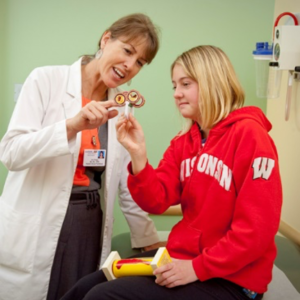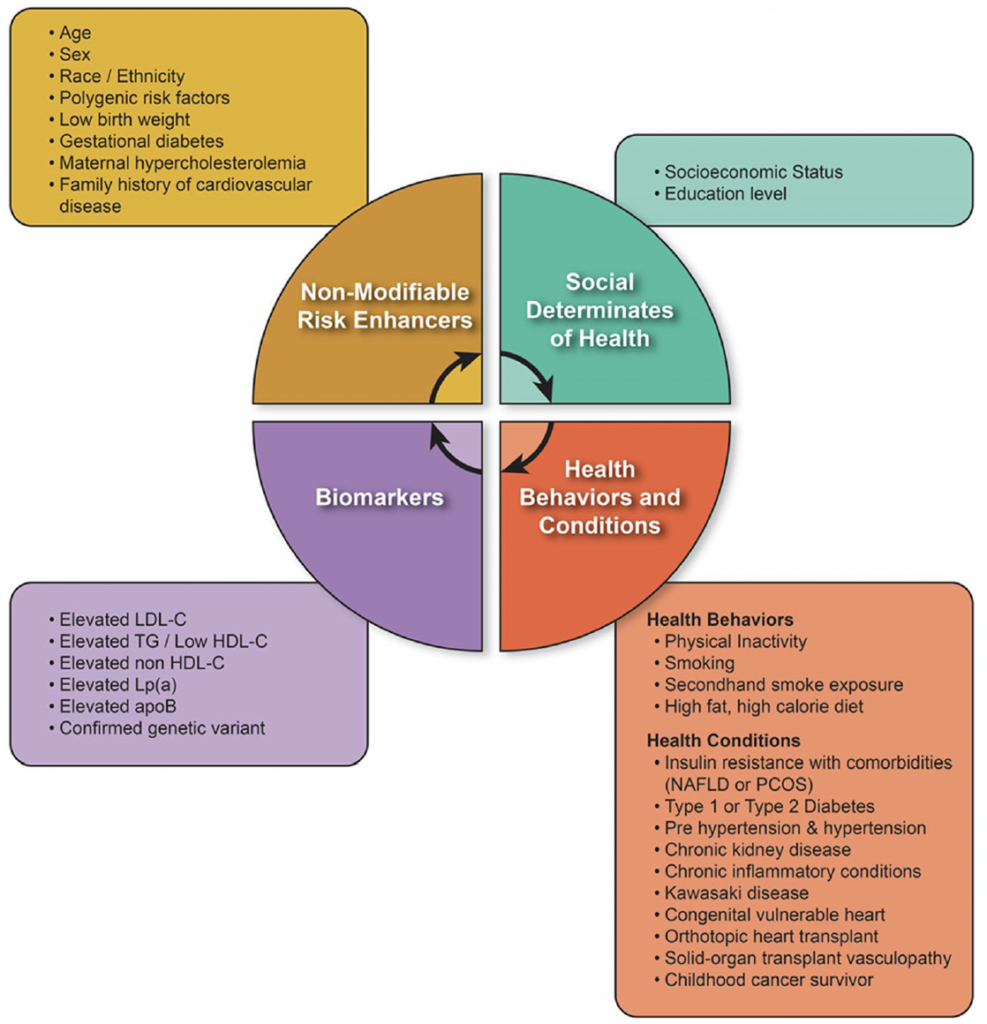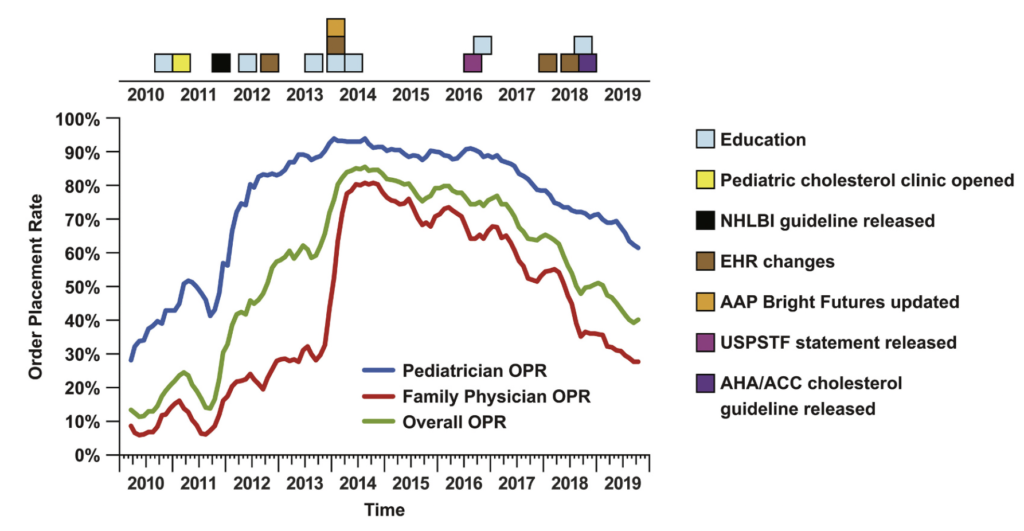Mission
Reducing or eliminating risks for early heart disease in children is the mission of the AFCH Pediatric Preventive Cardiology Clinic (PPCC). Early treatment of cardiovascular risk factors in childhood, including dyslipidemia, insulin resistance, hypertension, tobacco use, and increased BMI, have been shown to reduce the risk of atherosclerotic cardiovascular disease events, such as stroke and myocardial infarction, in adulthood. Therefore, our research involves methods to promote early prevention, identification, and treatment of these risk factors to promote optimal cardiometabolic health in adulthood.
Focus
 Dr. Peterson founded the PPCC in 2011 and directs the program. Preventive cardiology clinical care is provided to children with risk factors for early heart disease at AFCH and several outreach clinics. Clinicians also include Kristen Marten DO, Erin Marriott NP, and Alida Yee NP. Specialized pediatric nutritionists and support from our clinic nurses are of vital importance to our clinical team.
Dr. Peterson founded the PPCC in 2011 and directs the program. Preventive cardiology clinical care is provided to children with risk factors for early heart disease at AFCH and several outreach clinics. Clinicians also include Kristen Marten DO, Erin Marriott NP, and Alida Yee NP. Specialized pediatric nutritionists and support from our clinic nurses are of vital importance to our clinical team.
Research is a major component of our efforts. Our research has focused on:
- Systematic measurement and promotion of universal lipid screening in children
- Early detection and treatment of Familial Hypercholesterolemia, atherogenic dyslipidemia and other lipid disorders
- Cascade screening of relatives to identify Familial Hypercholesterolemia
- Impact of the COVID pandemic on cardiac risk factors in children
- Our team also participates in clinical trials for novel treatments of lipid disorders in children
Values
- Interdisciplinary approach with emphasis on family centered clinical care and ethical research practices.
- Collaboration with critical stakeholders including research scientists, statisticians, clinical and research nurses, technology professionals, as well as organizations that support our grant funding.
- Education for medical students, residents, fellows, and nurse practitioner students while also supporting these students in research endeavors.
Research Cores
Familial Hypercholesterolemia
Heterozygous familial hypercholesterolemia (HeFH) is an inherited disorder that leads to very high levels of LDL-C causing premature cardiovascular disease. HeFH is the most common life-threatening inherited metabolic condition, affecting 1 in 200-300 people. FH can increase an individual’s chance of early cardiovascular disease by 6- to 20-fold. Early identification of individuals with FH is critical in order to start lipid-lowering treatment and prevent early cardiovascular disease.
Our research focuses on novel screening methods to properly diagnose HeFH during the newborn period. Our team also participates in studies of treatments for pediatric HeFH, including the current state of pediatric HeFH treatment and application of novel lipid-lowering treatments to children.
For further information for families and providers on Familial Hypercholesterolemia: https://thefhfoundation.org

Universal Cholesterol Screening
In the past, only children with a strong family history of heart disease, diabetes, or other high-risk medical conditions were routinely screened for cholesterol problems. This resulted in sporadic lipid screening, with many children with severe dyslipidemia remaining undiagnosed. Studies have shown that about half of the children who have a serious cholesterol problem would be missed under the selective versus universal lipid screening strategy. Despite the recommendation for universal pediatric lipid screening from the NHLBI and the AAP, clinician compliance with the universal recommendation remains low nationwide. Our research has shown that lipid screening rates can dramatically improve with a multifaceted approach, including outreach, education, and electronic health record modifications efforts.

Telehealth
Through a rapid development in our telehealth clinical model, we will continue to research this format of providing care to our patients.
Health Disparities and Access
Future research is planned that will assess disparities in pediatric cholesterol screening and care outcomes based on demographic factors.
Summary
Our research focuses on reduction and elimination risk factors in children for cardiovascular disease by early identification and treatment. Cardiovascular disease, particularly in the form of atherosclerotic cardiovascular disease (ASCVD) begins in childhood. Our research will continue to delve into optimal lipid screening strategies for children, ASCVD risk factors, early identification and treatment of Familial Hypercholesterolemia, FH cascade screening of other family members, disparities in outcomes based on demographics, as well as assessing the new telehealth model of clinical care.
Research News

Amy Peterson begins term as chair-elect of national committee focused on cardiovascular disease prevention
The American Heart Association Young Hearts Cardiovascular Disease Prevention Committee is charged with advocacy for heart health policy for all young people, education of health care team members and the public surrounding heart health in young people, …
August 14, 2024
Department of Pediatrics will host 18 Shapiro Summer Research Program students
This summer, 14 Department of Pediatrics faculty members from seven divisions will open their research groups to 18 medical students through the Shapiro Summer Research Program. Since 2002, the Shapiro Summer Research Program has provided …
May 6, 2024
Department supports 15 research and scholarly projects in 2023 with its R&D Awards
In calendar year 2023, the Department of Pediatrics provided department members with $142,105 through its Research and Development (R&D) Awards. The purpose of the R&D Awards fund is to support research and scholarly activities, including …
December 7, 2023
Faculty promotions for 2023
Congratulations to the 20 Department of Pediatrics faculty who were approved for promotion this year. Their new ranks became effective July 1, 2023. Below is a list of the individuals who received promotions and their …
July 3, 2023
WMAA honors four department members with 2023 Distinguished Medical Alumni Awards
The Wisconsin Medical Alumni Association honored its 2023 Distinguished Medical Alumni Award recipients during a banquet on April 28 at the Madison Concourse Hotel. Among the awardees were four members of the Department of Pediatrics. …
May 15, 2023- More News

Phone
(608) 262-5024
Mailing Address
600 Highland Ave – H6/5
Madison, WI 53792-9988
United States